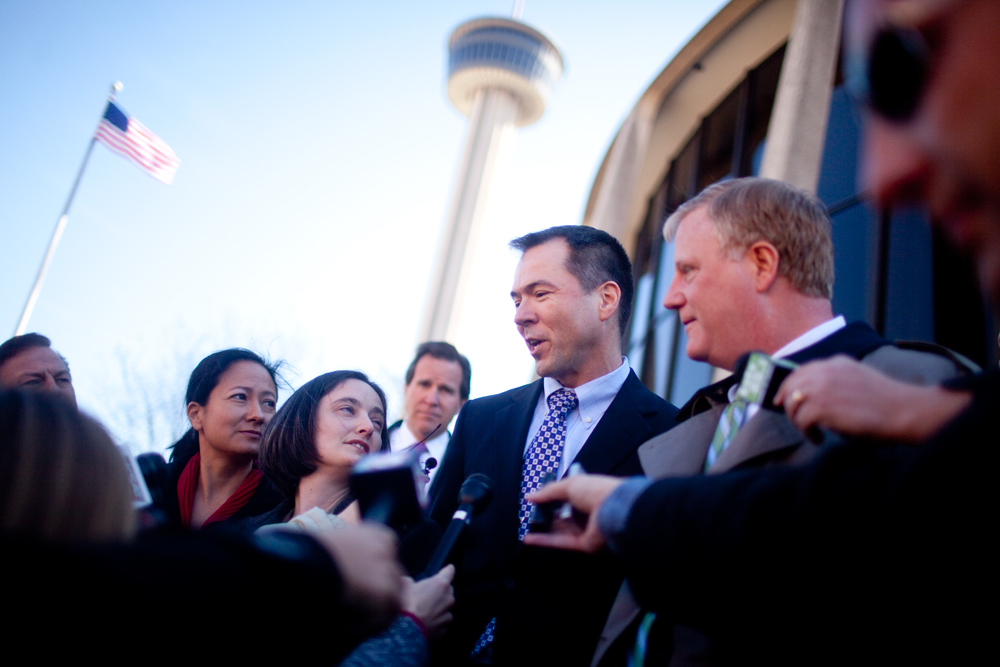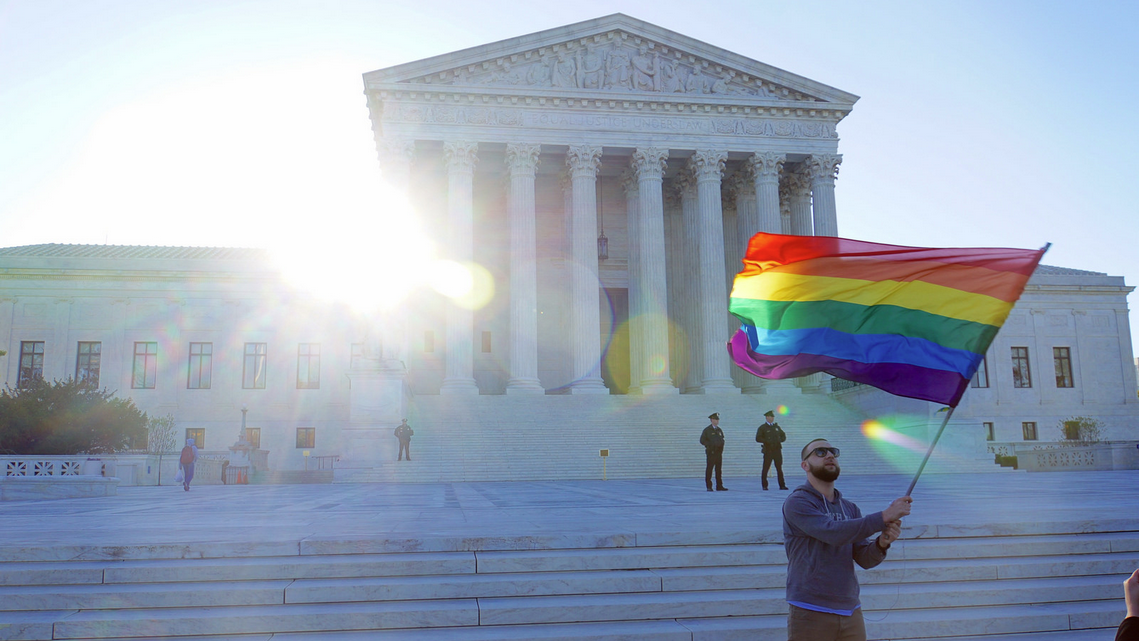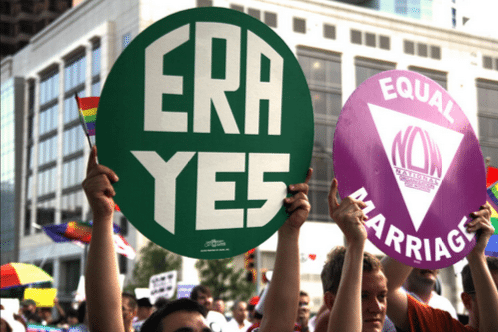
Couples Challenge Texas’ Same Sex Marriage Ban in Court

Above: From left, Cleopatra De Leon, Nicole Dimetman, Vic Holmes and Mark Phariss, speak with reporters after oral arguments in their suit to overturn Texas' same-sex marriage ban. Their attorney Neel Lane is behind them.
Couples that challenged Texas’ ban on same-sex marriage last fall—two women from Austin and two men from Plano—were in federal court today as their lawyers made their case before U.S. District Judge Orlando Garcia. Attorneys for Nicole Dimetman, Cleopatra De Leon, Mark Phariss and Vic Holmes argued in San Antonio this morning for a preliminary injunction, which would scrap Texas’ same-sex marriage ban while the case proceeds through the courts. After two hours of oral arguments today, they’re waiting for Judge Garcia’s decision, which may take a week or more.
“Every day this prohibition is in place is another day these people are denied equal protection under the law,” their lawyer Neel Lane said.
San Antonio was home to an acrimonious debate last year over extending the city’s non-discrimination ordinance to cover sexual orientation. But there were no chanting activists waving signs outside the John H. Wood, Jr. U.S. Courthouse this morning. Only a short line for the metal detector and a few people in the packed courtroom with the words “NO H8” on their cheeks suggested this was the opening day of a potentially momentous case in Texas.
The national mood toward marriage equality has changed dramatically even since 2005, when three-quarters of Texas voters supported a constitutional ban on same-sex marriage. In 2004, Massachusetts became the first state to approve same-sex marriage, and after a decade, 16 more states plus Washington, D.C. have followed suit. With the case heard this morning, Texas joins the ranks of states forced to defend their bans in court—many of them launched since 2013, when the U.S. Supreme Court struck down part of the federal Defense of Marriage Act that defines marriage as between a man and a woman.
Some of those cases are further along, and the decisions are coming fast—just today, a federal judge in Kentucky struck down that state’s ban on same-sex marriage. On Monday, Nevada’s attorney general announced she’d quit defending her state’s ban.
Outside the courthouse in San Antonio today, Phariss called on Attorney General Greg Abbott to do the same in his case. But in the courtroom, Abbott’s lawyers made it clear just how unlikely that would be.
After acknowledging the “robust social and democratic debate” about same-sex marriage around the country, Assistant Texas Solicitor General Michael Murphy explained the state’s intent to “preserve the traditional definition of marriage” and reject what he called—referring to Massachusetts’ 2004 law approving same-sex marriage—”a more recent innovation than Facebook.” This lawsuit, Murphy said, was simply intended to “remove the issue of same-sex marriage from the democratic process.”
But Barry Chasnoff, another of the plaintiffs’ lawyers, argued that Texas’ democratic process had simply left his clients behind, forcing them to ask the courts to help guarantee their rights. “The very existence of [Texas’ ban] is evidence they don’t have political power,” he said.
Murphy disagreed. After many recent advances to the LGBT rights cause, he said, gay and lesbian couples were doing just fine without the courts getting involved. “The staggering political gains by these people in such a short period of time,” he said, “belies their claim of political powerlessness.”
The plaintiffs, sitting just behind their lawyers, furrowed their brows and exchanged skeptical looks as Murphy laid out the state’s case—particularly as he explained that Texas’ law is not meant to discriminate against same-sex couples, but to “promote responsible procreation.”
Chasnoff called that argument “ludicrous,” recalling his aunt who married when she was 80 years old, and never had to prove she could have kids. That was the only line that drew laughs from the courtroom this morning, but the point underscored a serious difference between the two sides’ definition of marriage: Murphy suggested Texas’ interest in marriage was about making more Texans, while the plaintiffs’ lawyers noted there are lots of other reasons two people might want to marry—and by the way, same-sex couples (lots of them) raise kids in Texas too.
When De Leon had a baby, Chasnoff noted, her partner Dimetman couldn’t be included on the birth certificate. Along with other parental rights, Lane added, there’s the state’s recognition of communal property, rights to child support if a couple divorces and a couple’s right to make healthcare decisions for one another in an emergency.
“What my clients want are the rights, the benefits, the responsibility and the respect that come with being married,” Chasnoff said. “What makes it a fundamental right is their relationship, not the color of their skin or their sexual orientation.”
Chasnoff said same-sex marriage is just the latest cause in which a group has appealed to the courts for protection from state laws, referencing U.S. Supreme Court decisions on school segregation, voting rights and interracial marriage. “We’re not asking the state to redefine marriage,” Chasnoff said. “Our clients just want the same rights as other citizens.”
Judge Garcia left the courtroom without deciding on the injunction, but he recognized that whatever he decides, the appeals and rulings on other same-sex marriage cases will take the ultimate call out of his hands. “Any one of these cases,” he said, “or a combination, or all of them, will make their way to the Supreme Court.”


